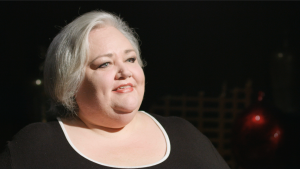Stephanie Blythe: Uncaged
Description
Stephanie Blythe was one of the fastest rising stars in opera when an anxiety disorder threatened to take her down. But she refused to let it be her undoing.
Featured Artists

Stephanie Blythe is a much-admired opera singer and recitalist. Winner of the prestigious Tucker Award and the Opera News Award, she has performed on many of the world’s great stages, including Carnegie Hall, the Metropolitan Opera, Covent Garden, and the Paris National Opera.
Blythe grew up in upstate New York and attended SUNY Potsdam, where she studied English writing and music. Initially interested in musical theater and popular music, she moved into opera in her early 20s and won the Metropolitan Opera National Council Auditions in 1994. She made her Met debut in 1995, and has become a stalwart of the prestigious company, appearing in numerous productions in the succeeding decades.
A powerful and expressive mezzo-soprano, Blythe has a repertoire extending beyond opera to musical theater, classical recitals, contemporary rock, and cabaret―for which she performs under her drag alter-ego Blythely Oratonio.
Full Episode
- Music
- Art & Design
Transcript
Whether classical, or classic rock…
(Stephanie Blythe singing “Faithfully” by Journey)
I’m forever yours
Faithfully
Stephanie Blythe has had an unquenchable need to sing.
Stephanie Blythe: There’s something about letting loose and just taking a risk, being brave, making that sound. When you connect to it, and it’s right, it’s like a drug. You just can’t stop.
It’s rather a good thing that Blythe won’t be asked to stop singing any time soon. For the past 25 years, she’s been one of the most beloved operatic voices around. In 1994, she got a foot in the door when she won the prestigious Metropolitan Opera National Council Auditions. 1995 brought her Met debut, and in 1996, her big break. When the legendary mezzo soprano Marilyn Horne took ill, it fell to a 26-year-old Blythe to take her place as Mistress Quickly in Verdi’s Falstaff. She pulled it off brilliantly, and suddenly she was in high demand. Then, in 1999, she won the Richard Tucker award, the ultimate honor for any young singer. But as her success mounted, so too did her anxiety.
Blythe: The first time I ever was really hit by it, I ended up in three different emergency rooms over three different nights, and the second emergency room doctor said “You know, I suspect that you’ve been on a low boil most of your life, and your tea kettle just, it just blew.” And I think that he was right. I think that what happened was my psyche said okay, now you have the wherewithal to take care of yourself, you have a great job, take care of yourself. You can do this. And that’s what happened.
Years of therapy, she says, saved her life, and today, Blythe has at last found peace.
Blythe: I used to pray fervently, in the middle of an anxiety attack, please God, take this away from me. I don’t want this. Please, I can’t take this. And he never did. And then I realized one day that I was meant to experience this. This was meant to happen to me, and in this life we all have a well, and into that well, we’re just constantly pouring experience. Constantly pouring experience. And it’s from that well that we fish out all the things that we need to when we’re on stage.
Blythe was raised in rural Sullivan County, New York, where her dad, an accomplished jazz musician, encouraged her to master, not singing, but the flute.
Blythe: We never listened to singers.
AJC: Oh?
Blythe: No, we never listened to singers. I was not encouraged to be a singer. It was actually my high school choral director who told my father that I had to be in the chorus.
AJC: But you would have been singing in the shower and the like, did you have a sense of this sound I’m making is pretty good?
Blythe: I don’t know if I recognized that at all. I know that when I sang at church that people would comment on it, and I know that when I was at school, people would comment on it, and as I got older and my friends and I started jamming a little bit more, and I had one of my best friends all through high school play the piano, and we’d get together in homeroom and he would play Journey songs, he would play like “Faithfully”, “Open Arms,” all those great numbers.
AJC: “Don’t Stop Believin’!”
Blythe: Oh yeah. I really loved belting out ballads. More than anything. I loved it.
AJC: And did I read somewhere that you were more interested in Broadway than opera to begin with?
Blythe: I was more interested in Broadway than opera, yeah.
AJC: What changed?
Blythe: I wasn’t encouraged to do that by many people, because I didn’t fit a physical mold. I was a big kid, and being an opera singer came not really as an afterthought, I didn’t really start singing really working on my voice until I was about 21. So once I started getting interested in technique, and understanding my instrument, then opera started to make more sense to me, and became something that I really started to love.
But even with her great successes in opera, Blythe has continued to pursue other ways of expressing her love of song. In 2015, she started experimenting with cabaret, and in 2017 made her debut as the sometimes ukulele playing drag artist, Blythely or Antonio.
Today, Stephanie Blythe is a consummate artist, one who revels in discovering even more ways to entertain herself, and us.
Blythe: I never thought that I would play the ukulele, or any number of opera roles, or be a drag queen, king. I never thought about that. I never thought I’d be a drag artist. I am. And it makes me unbelievably happy.

